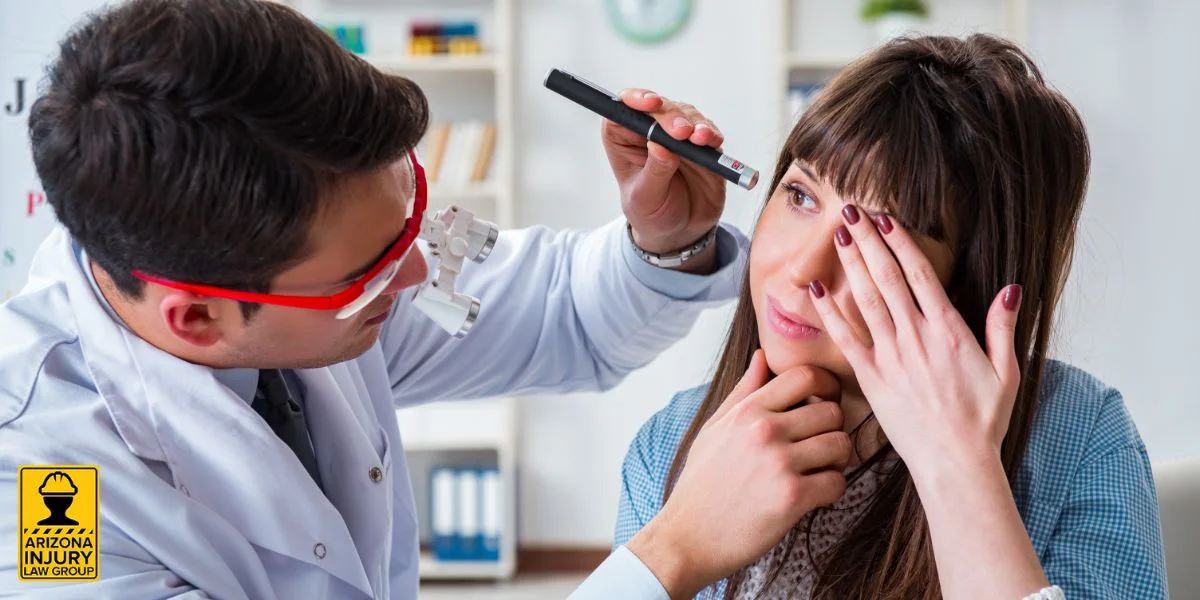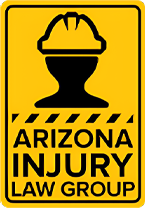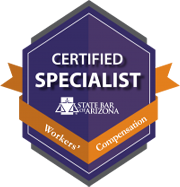Phoenix Eye Injury Workers’ Comp Lawyer

Phoenix Eye Injury Workers’ Comp Attorney
Suffering an eye injury at work can cause unexpected lifelong negative impacts on your life. The support of a Phoenix eye injury workers’ comp lawyer from Arizona Injury Law Group can provide essential support in your workers’ comp claim. Our attorneys can ensure that you receive fair and maximum benefits and compensation for your losses. You deserve to provide yourself with the greatest possibility of your claim’s success, and partnering with one of our workers’ comp attorneys in Phoenix offers exactly that.
Common Industries Where Workplace Eye Injuries Occur
Workers in industries such as manufacturing, welding, mining, and construction suffer more eye injuries than most. Industries that involve operating heavy equipment and performing work tasks in dangerous environments may offer more risk, but an eye injury can happen in any work setting, even in the office.
Many people in Phoenix work in an industry that places them in contact with dangerous substances, such as:
- Liquid chemicals
- Caustic liquids
- Chemical gasses and vapors
- Flying particles and sparks
- Molten metal
In these work environments, it is recommended that you wear safety protection, like goggles or masks. This can serve as protection against the dangerous conditions you work in and prevent injuries from happening.
Common Causes of Eye Injuries in Workers’ Compensation Claims
Several common causes of eye injuries have emerged in workers’ compensation claims, such as the following:
- Chemical Exposure: Close-up contact with hazardous chemicals and substances, such as cleaning liquids, acids, solvents, and more, can lead to chemical burns, irritation, or permanent eye damage.
- Blunt-Force Trauma: Objects piercing the eye, such as shards of glass, metal, tools, equipment, or debris, can cause nerve damage, fluid loss, lacerations, and more serious damage to the eye.
- Exposure to Radiation: Radiation exposure through industries such as healthcare, welding, and construction can be a huge risk for eye injuries, leading to conditions such as cataracts or photokeratitis.
- Foreign Objects: Any foreign object entering the eye, like metal fragments, wood chips, chemicals, or dust, can cause cuts, abrasions, and irritation.
- Biological Hazards: Serious eye infections and disease can happen when an eye comes in contact with biological hazards, like infectious agents, bodily fluids, and bloodborne pathogens.
- Poor Ergonomics: In today’s work environment, many individuals engage in prolonged use of computers and other digital devices without proper ergonomic setups or breaks. This can lead to serious eye fatigue, strain, and conditions like computer vision syndrome (CVS) and dry eye syndrome.
Industries where dangerous conditions are common should provide proper safety measures, like personal protective equipment, and ensure the proper training to perform work duties to minimize the risk of eye injuries.
How a Workers’ Compensation Lawyer Can Help
If you are looking for the essential support of workers’ compensation, the aid of a trusted and experienced lawyer is vital to receiving maximum compensation and benefits. Below are specific ways that an attorney can help you:
- Legal Understanding and Case Evaluation: Attorneys focusing on workers’ compensation claims hold a solid grasp and understanding of the merits and specific requirements of a successful claim. They can conduct a thorough evaluation and inform you of the specific legal options that you may have.
- Case Administration Support: An attorney can handle many details surrounding your case. These include administrative tasks, like filling out documents and filing them at the appropriate times and handling correspondence between necessary parties. This takes a lot of the pressure off their clients, as they can rest assured that their attorney has the details covered.
- Negotiation and Litigation Representation: A chief role that an attorney offers clients is representation in negotiations and litigation. An attorney can present their client’s injury and damages accurately, with compelling arguments that support the compensation and support they are seeking. If the claim moves to litigation, they can advocate for their client in front of a judge and jury, not settling for unfair treatment.
- Advocacy: From the first meeting until the final moments of the case, an attorney serves as a trusted legal advocate, upholding their client’s rights and fair treatment throughout the case. As questions and concerns emerge, clients can consult their attorneys to receive sound advice and legal guidance.
FAQs
Q: How Much Compensation Can You Get for Eye Loss in Arizona?
A: The amount of compensation that you can get for eye loss in Arizona is based on the specific circumstances of the injury. This includes factors like the severity of the eye loss, its impacts on an individual’s ability to work, and more. The Arizona workers’ compensation system provides benefits that are tailored for certain types of injuries, including vision loss. Compensation can be different if the eye loss is just in one eye or both eyes.
Q: What Percent of Vision Loss Qualifies for Disability in Arizona?
A: The percent of vision loss that qualifies for disability in Arizona has two conditions. If the individual’s vision can’t be corrected to 20/200 in the better eye, and if a vision field that is lower than 20 degrees is anticipated to last one year or longer, an individual can qualify for low-vision disability.
Q: How Is Visual Impairment Calculated in Arizona?
A: Visual impairment is calculated in Arizona based on corrected vision, or vision with contacts or glasses, and binocular rating, which is based on the vision system that considers both eyes. The results of this evaluation are classed on a scale of 1 to 4. The degree of impairment can affect the amount of compensation that will be needed to manage it.
Q: What Does 30% Impairment Mean?
A: 30% impairment means that a victim is suffering impairment that affects at least 30% of their body. The bodily impairment rating is also called the whole person impairment rating in several states. Typically, a 30% or higher bodily impairment rating indicates that a victim has a serious injury and can receive disability benefits.
Contact a Local Phoenix, Arizona, Eye Injury Workers’ Comp Lawyer Today
If you have suffered a serious eye injury at your place of work, you may be eligible to pursue a workers’ compensation claim. At Arizona Injury Law Group, we are ready and available to listen to the details of your situation. Our team can determine whether your case has the legitimate merits for a legal claim. Reach out today to set up a consultation and learn how we can step in and help.
Get Help Today
Call Immediately For A Free, No Obligation Consultation And Let Us Help You Put Your Life Back On Track. Let Us Help You
Regain Normalcy And Stability Again. We Want To Help You Get The Benefits You Need And Deserve!


